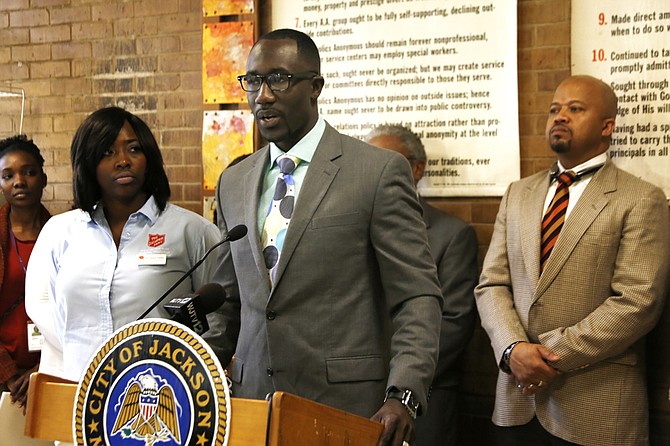Mayor Tony Yarber (center) this morning credited his wife, Rosalind (left), who works for the Salvation Army, with coming up with the goal of ending homelessness among veterans by the end of the year. Also pictured is Marshand Crisler (right), deputy chief administrative officer for the City of Jackson. Photo by Imani Khayyam.
On any given night in America, approximately 50,000 veterans are homeless—those who joined the military to fight for this country—and roughly 10 percent of them are women.
That number, the result of the annual point-in-time homelessness count in January 2014, represents a drop from the 2013 count, information from the U.S. Department of Housing and Urban Development shows. However, Mississippi was among the states with the largest increase in homelessness with 57 percent overall between 2007 and 2014.
Local nonprofit and government officials want to stem that tide in Jackson. In fact, Mayor Tony Yarber this morning credited his wife, Rosalind, who works for the Salvation Army, with coming up with the goal of ending homelessness among veterans by the end of the year.
"That's more than (a) notion," Yarber told reporters today at Billy Brumfield Men's Shelter. "It's more than providing food and a bed; it's about how we provide wrap-around services that ensure that we are building capacity of our citizens who don't have roofs over their heads."
Veterans, especially those returning from the recent conflicts in Afghanistan and Iraq, often have severe disabilities, including traumatic brain injuries, post-traumatic stress disorder and other mental-health problems that are closely tied with homelessness. Helping these veterans requires the involvement of agencies ranging from housing authorities, the U.S. Veterans Affairs Administration and local nonprofits.
Sheila Jackson, executive director of the Jackson Housing Authority, said the agency has leased 244 of the 295 housing vouchers it receives from the HUD, and the agency recently applied for 30 more to meet demand.
Today's announcement was in response to an initiative of the Obama administration, announced in June 2014, challenging local officials to ensure that returning veterans have permanent homes.
"When you serve our nation in the bravest of ways, you should not have to wonder where you will lay your head at night. The administration and communities across the country have taken bold action to use existing resources to create permanent supportive housing and ensure the targeting of the most vulnerable people," Shaun Donovan, secretary of the U.S. Department of Housing and Urban Development, said in a press release at the time.
The program, called Opening Doors, emphasizes a housing-first approach, prioritizing vulnerable veterans, rapid re-housing to prevent vets from slipping into long-term or chronic homelessness, coordinating outreach efforts to identify and engage every veteran experiencing homelessness, and focusing outreach efforts on housing.



Comments
Use the comment form below to begin a discussion about this content.
comments powered by Disqus